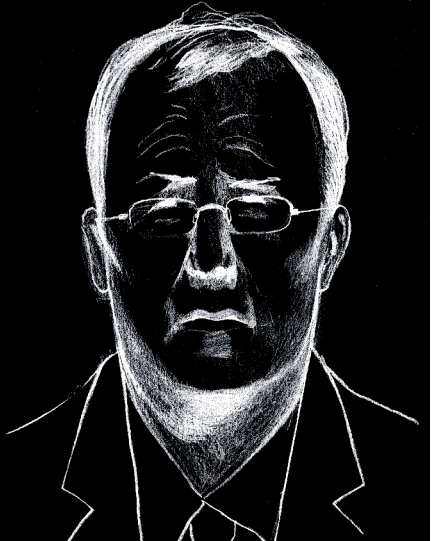I'm very pleased that you think I am so important that I'm deserving of mention.
When are you going to get it through that thick skull of yours that I expose frauds and con artists for a living?
BTW GayForReal7, I love my job.
I'm very pleased that you think I am so important that I'm deserving of mention.
HRC: Homosexual lobby’s report features dark graphic caricature of AFTAH’s LaBarbera

You have never been able to expose me, though, huh. :think:
And I think my job is far more impressive than yours. :AMR1:

DOESN'T LOOK LIKE OUR PETER!!! :nono:
Not a gay activist, sorry.(Sigh, he reminds me so much of "Prove I said that!" Aaron).
I'll let the readers decide by reviewing part 3's table of contents.
Without a doubt, as a paid homosexual activist you get to meet with many influential people.

Just out of curiosity, when did Peter LaBarbera put his first restraining order out against you?
Not a gay activist, sorry.
Not only did Peter never take a restraining order out against me,
he is always pleasant and cordial, and keeps on inviting me to see him speak. :AMR1:
Oh....but he doesn't like you.
Right, like I really care. :chuckle:(Creepy).
I noticed since I exposed the God-hating homosexual Friedrich Nietzsche that you changed to your signature to a quote by Soren Kierkegaard.
It appears that the two have quite a bit in common through "existential philosophy".
http://thepopularfront.wordpress.co...d-comparing-their-contribution-to-philosophy/

If there are any other uneducated "Kentucky hicks" out there like myself, existentialism is the following:
Existentialism – A Definition Existentialism in the broader sense is a 20th century philosophy that is centered upon the analysis of existence and of the way humans find themselves existing in the world. The notion is that humans exist first and then each individual spends a lifetime changing their essence or nature. In simpler terms, existentialism is a philosophy concerned with finding self and the meaning of life through free will, choice, and personal responsibility. The belief is that people are searching to find out who and what they are throughout life as they make choices based on their experiences, beliefs, and outlook. And personal choices become unique without the necessity of an objective form of truth. An existentialist believes that a person should be forced to choose and be responsible without the help of laws, ethnic rules, or traditions.
http://www.allaboutphilosophy.org/existentialism.htm
While I talk about how the homosexual Human Rights Campaign has a Christian pastor at the top of their "hit list" (literally), perhaps you could tell us what is so great about a society where people can make choices and be responsible without the help of "laws, ethnic rules, or traditions".

Right, like I really care. :chuckle:
I change my quotes to suit myself.
Were you too thick-skulled to notice all my Kierkegaard quotes and avatars in the beginning? :think:
I wasn't exactly trying to keep it secret.
I am proud to be a Kierkegaard scholar and not some Kentucky back-woods cop.
Kierkegaard is a highly respected Christian thinker, and I don't care what a bumpkin like you thinks...
Kierkegaard will never be up for debate. Go read the Enquirer as it's at your level. :ha:It appears that your quotes suit your secular humanist philosophy.
How can a "highly respected Christian thinker" not use objective truth (i.e. God's Word as seen in Holy Scripture) as a basis for his philosophy but instead believe that personal choices become unique without the necessity of an objective form of truth?
How can a "highly respected Christian thinker" believe that a person should be forced to choose and be responsible without the help of laws, ethnic rules, or traditions?(i.e. Judeo-Christian based laws, rule and traditions).
Inquiring minds needz sta know.
Kierkegaard will never be up for debate. Go read the Enquirer as it's at your level. :ha:
No. I am a firm Kierkegaardian, and proud to be. Which is why when I joined this forum I used his picture as my avatar, and his quotes as my signature. I obviously wanted to be known as a Kierkegaardian.Who is next on your list of secular humanist philosophers whose quotes you'll be using on your signature....
Karl Marx?
No. I am a firm Kierkegaardian, and proud to be. Which is why when I joined this forum I used his picture as my avatar, and his quotes as my signature. I obviously wanted to be known as a Kierkegaardian.
He is the supreme Christian, and he is right in his claim that most people will never be Christians. Of course no cop could ever be a Kierkegaardian, as the IQ is too low to read him. :cheers:
You have to read all of Kierkegaard's works, the Edifying Christian Discourses, Attack Upon Christendom, Fear and Trembling, before you can understand him. It takes years of study. You can't do it by going on the internet and grabbing a few links.Then tell us how a "supreme Christian" can promote existential philosophy.
http://thepopularfront.wordpress.co...d-comparing-their-contribution-to-philosophy/
http://www.allaboutphilosophy.org/existentialism.htm
MAN 'S NEED OF GOD
Soren Kierkegaard
.....the discourse does not wish to startle you, my
hearer, nor to shock you out of your continuity with
yourself. When we speak of being content with the grace
of God, the reason doubtless is that the grace of God does
not express itself in our experience as a human being
would like, or finds it easy to understand, but speaks
instead a more difficult language.
When the grace of God
grants to a man what he likes and desires, he is not merely
content, but happy and grateful; under such circum-
stances he deems himself fully capable of understanding
that God is good and gracious. That this is a misunder-
standing, to the refutation of which, however, no one
need leap too promptly and eagerly, is certain enough.
One need not on that account omit to train oneself in the
truer and more difficult interpretation while there is
still time and opportunity.
If it is possible for a human
being to persuade himself of the grace of God without
the intermediation of any temporal testimony, or with-
out leaning upon that interpretation of God's providence
which makes it profitable for him according to his own
ideas of what is profitable, then indeed it is quite certain
that for him the grace of God is the highest good. And
he will then strive to rejoice in God's grace so as not
merely to rest content with it; and he will give thanks
for it so as not merely to find it barely sufficient. He will
not grieve over what God has denied to him; he will not
be overmuch concerned with the difference in mode of
expression which formerly existed between God's ever-
lasting faithfulness and his own childish littleness of faith.
For now this difference in language no longer exists, in
that "his heart is strengthened by grace and not by meat."
144
If someone suffering from some deprivation, enjoyed
the friendship of a great man, but this powerful friend
could do nothing to alleviate his suffering (which is com-
parable to the grace of God being without external con-
firmation) , the mere fact of his friendship with the great
man would nevertheless mean much to him. But here
perhaps we touch the difficulty. The sufferer might read-
ily persuade himself that the great man really was unable
to do anything for him; but how could any man in any
finite sense be persuaded that Almighty God could do
nothing for him!
Hence it results that our thoughts in
their impatience steadily insist that God can surely do
for us what we wish Him to do; and it is because of man's
impatience that the language speaks of trying to rest con-
tent with the grace of God. In the beginning, when this
impatience was at its height, and cried out most loudly
to be satisfied, it could scarcely be made to understand
that the contentment of which we speak could be praise-
worthy. But as the impatience subsided, and the sufferer
found rest and peace in the serene incorruptibility of the
inner man, he began to understand this more and more,
until at last his heart was moved, and he came to behold
a vision, even if only intermittently, of the divine glory
—the divine glory which had taken upon itself so humble
a form.
And if this glorious vision vanishes, so that he
again becomes a sufferer, as in truth he was even while he
beheld the vision; if it again seems to him that it requires
a contented spirit to find the grace of God sufficient for
his needs; he nevertheless sometimes admits to himself
with shame that the grace of God is something that one
may well find worthy of one's contentment; aye, that it is
of all things most worthy to be desired; aye, that it is of
all things most blessed to possess.
MAN S NEED OF GOD
145
So then it happens, little by little, for the grace of God
can never be seized by force, that the human heart be-
comes in a very beautiful sense more and more discon-
tented, more and more burning with desire, more and
more filled with longing, for the assurance of the grace of
God. And behold, now all things have become new, every-
thing is changed. In the case of the earthly goods of life
the principle obtains that man needs but little, and in
proportion as he needs less and less he becomes more and
more perfect. A pagan who knew only how to speak of
earthly things, has said that God was happy because He
needed nothing at all, and next to Him in happiness was
the wise man, because he needed little. But in the rela-
tion between a human being and God this principle is
reversed: the more a man needs God the more perfect he
is.
The word which speaks of letting the grace of God
suffice us is by no means intent merely upon offering us
consolation, and upon re-affirming this consolation when-
ever earthly want and deprivation makes it seem neces-
sary. For when a human being has fully awakened to its
import it calls him aside, to a place where he no longer
hears the earthly mother-tongue of the worldly mind,
nor the customary speech of men, nor the alarums of the
actors on the stage of life. But he stands now where the
word is glorified, and confides to him the secret of per-
fection, namely, that to be in need of God is no shameful
embarrassment, but precisely the perfection of human
life, and that it would be the saddest of all tragedies if a
man passed through life without discovering that he
needed God.
Let us then strive to interpret to ourselves more clearly
this edifying thought:
146
man's need of god constitutes his highest perfection
The truth of this principle, that standing in need of
God constitutes a perfection, would seem to be attested
by a familiar circumstance, one which may serve at least
as a passing reminder. In the churches of the various
countries it is customary, after the sermon, to pray for
the ruler and the members of the ruling house. That
prayers are also offered for the sick and the sorrowing
cannot prove that being in need of God constitutes a
perfection, since these are sufferers.
THE UNCHANGEABLENESS OF GOD
Soren Kierkegaard 1847
TEXT The Epistle of James i : 1 7-2 1
Every good gift and every perfect gift is from above,
coming down from the Father of lights, with whom
can be no variation, neither shadow that is cast by
turning. Of His own will He brought us forth by the word
of truth, that we should be a kind of first-fruits of His
creatures. Ye know this, my beloved brethren. But let
every man be swift to hear, slow to speak, slow to wrath:
for the wrath of man worketh not the righteousness of God.
Wherefore putting away all filthiness and overflowing of
wickedness, receive with meekness the implanted word,
which is able to save your souls.
My hearer, you have listened to the reading of the text. How
near at hand does it not seem now to turn our thoughts in the
opposite direction, to the mutability of temporal and earthly
things, to the changeableness of men. How depressing and
wearisome to the spirit that all things are corruptible, that men are
changeable, you, my hearer, and I ! How sad that the change is
so often for the worse ! Poor human consolation, but yet a con-
solation, that there is still another change to which the changeable
is subject, namely that it has an end!
A mere beginning for the unlearned:
My philosophy degrees have nothing to do with you, nor my beliefs. It's academic. Do you really think everyone who does a thesis on Hitler loves Hitler? OMG, Smarten UP, man!!! :nono:Copying and pasting an article that you found on the internet doesn't explain Soren Kierkegaard's existential philosophy.
By the way: when you did your honor thesis on Friedrich Nietzsche, did you know that he was a homosexual and a HATER of God? (they both go hand in hand).


"But as much as Christianity is spirit, the sobriety of spirit, the honesty of eternity, there is of course nothing which to a detective's eye is so suspicious [as is]: Christian states, Christian lands, a Christian people, and (how marvelous!) a Christian world. [...] it is certain at this point that a monstrous, criminal offense has been perpetuated; yea, everything this world has hitherto seen in the way of criminal affairs is a mere bagatelle in comparison with this crime, which has been carried out generation after generation through long ages , eluding human justice but has not got beyond the arm of Divine Justice."
